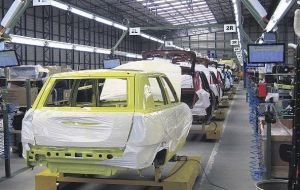MercoPress. South Atlantic News Agency
Uruguayan auto assembly industry exempt of Brazil’s IPI 30% tax increase
 Uruguayan car assembly plants do not comply with Brazil’s 65% local or regional components condition
Uruguayan car assembly plants do not comply with Brazil’s 65% local or regional components condition In the framework of the so called Plan Maior, Brazil adopted measures to stimulate its industry with the purpose of increasing productivity and containing competition from Chinese produce in its domestic market.
In this context Brazil decreed the reduction of the 30% IPI tax increase for those Brazilian vehicle manufacturers which complied with a the 65% local components content rule, and also considered in that percentage auto-parts from Mercosur members.
The measure also established that the IPI 30% tax reduction applicable to Brazilian auto plants was extensive to those countries with which Brazil has updated specific sector agreements such the cases of Mexico and Mercosur, as long as those companies were also established in Brazil.
This last safeguard left three Uruguayan assembly plants outside the benefit, but has now been amended.
Last week a delegation from the Uruguayan auto industry plus government officials travelled to Brazil to discuss the latest tax and tariff package and was able to obtain a commitment from the President Dilma Rousseff administration that Uruguay would be left out of the stimuli measures implemented (the IPI 30% tax increase).
In Uruguay the local assembly plants with Mercosur integration programs must sustainedly increase the percentage of national and regional components. The scale starts at 30% and climbs to 50% in five years.
Uruguay has an export quota free of tariffs to Brazil of 20.000 cars per year, which so far it has never managed to achieve mainly because of low productivity and labour conflicts, according to the assembly plants.
Some of the brands involved are Cherry Face and Cherry Tigo, Lifan 320, Lifan 620 and KIA Bongo. The first four are of Chinese origin.
Brazil is Uruguay’s main trade partner having absorbed in first nine months of the year 18.5% of exports almost 1.2 billion dollars, which represents a 17% increase over the same period a year ago.
In 2010 Uruguayan auto industry exports to Brazil totalled 120 million dollars.




Top Comments
Disclaimer & comment rules-

Read all commentsI imagine there will be some rapid re-structuring of manufacture of Chinese cars in Uruguay for export to Brasil.
Oct 06th, 2011 - 01:14 pm 0Just re-boxing and adding the label 'Made In Uruguay' will no longer be acceptible.
Looking forward to the same import controls and taxes for Chinese, Vietnamese and Indonesian clothes and shoes.
Commenting for this story is now closed.
If you have a Facebook account, become a fan and comment on our Facebook Page!